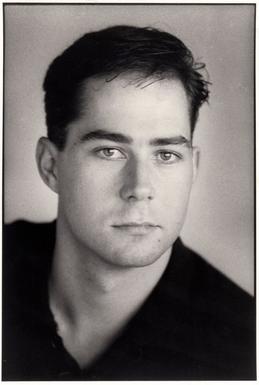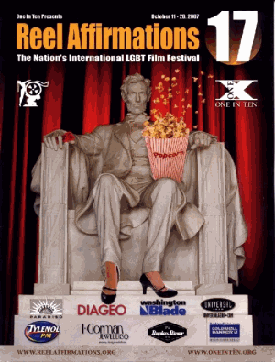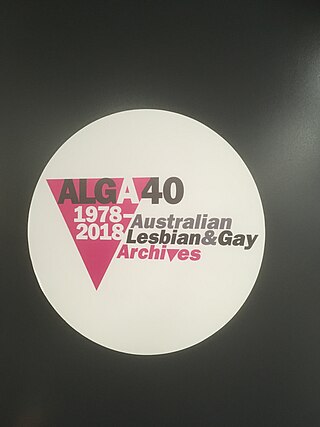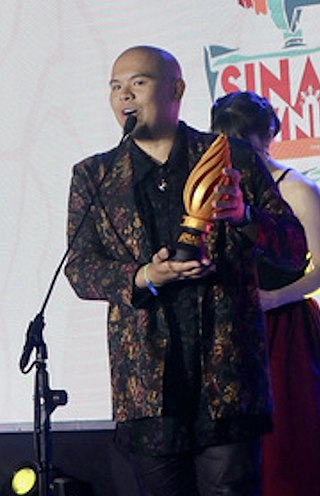"New queer cinema" is a term first coined by the academic B. Ruby Rich in Sight & Sound magazine in 1992 to define and describe a movement in queer-themed independent filmmaking in the early 1990s.
I Am Not What You Want is a romance movie produced by Kit Hung in Hong Kong in 2001. This movie is about 48 minutes.
Ana Kokkinos is an Australian film and television director and screenwriter of Greek descent. She is known for her breakthrough feature film Head On (1998), and has directed television shows such as The Secret Life of Us, The Time of Our Lives and Ten Pound Poms.
ACMI, formerly the Australian Centre for the Moving Image, is Australia's national museum of screen culture including film, television, videogames, digital culture and art. ACMI was established in 2002 and is based at Federation Square in Melbourne, Victoria.

Tim Conigrave was an Australian actor, activist and author of the internationally acclaimed memoir, Holding the Man.
Seattle Queer Film Festival is an annual film festival in Seattle. The 28th Annual Seattle Queer Film Festival will take place October 12-22, 2023. It is the largest LGBTQIA+ film festival in the Pacific Northwest, and its award-winning films receive national praise. At the festival each film is able to receive an award which is decided on by a jury. Kathleen Mullen is the artistic director of Three Dollar Bill Cinema, the organization that produces the Seattle Queer Film Festival. Kathleen Mullen is the Artistic Director of the Seattle Queer Film Festival in charge of all festival programming and operations. Billy Ray Brewton is the Managing Director (2021-2023)

The Frameline Film Festival began as a storefront event in 1976. The first film festival, named the Gay Film Festival of Super-8 Films, was held in 1977. The festival is organized by Frameline, a nonprofit media arts organization whose mission statement is "to change the world through the power of queer cinema". It is the oldest LGBTQ+ film festival in the world.
Melbourne Gay and Lesbian Chorus (MGLC) was founded in Australia in 1990 by a gay performer and activist, Lawrence Emanuel (1966). The chorus was first named 'AL sounds', due to its part affiliation with the Foundation. In April 1994, the name was changed to Melbourne Gay and Lesbian Chorus, reflecting the chorus's organizational independence and a desire to further challenge stereotypes.

Reel Affirmations (RA) is a non-profit, all-volunteer LGBT film festival in Washington, D.C. Founded in 1991 and held every year in mid-October, as of 2011 Reel Affirmations was one of the largest LGBT film festivals in the United States. Baltimore's Gay Life newspaper called it "one of the top three films festivals for the entire LGBT community." A 2007 guidebook claims it was one of the largest LGBT film festivals in the world. A listing of LGBT film festivals claims it is the largest all-volunteer film festival in the world.
Palace Cinemas is an Australian cinema chain that specialises in arthouse and international films.

The Australian Queer Archives (AQuA) is a community-based non-profit organisation committed to the collection, preservation and celebration of material reflecting the lives and experiences of lesbian, gay, bisexual, transgender and intersex LGBTI Australians. It is located in Melbourne. The Archives was established as an initiative of the 4th National Homosexual Conference, Sydney, August 1978, drawing on the previous work of founding President Graham Carbery. Since its establishment the collection has grown to over 200,000 items, constituting the largest and most significant collection of material relating to LGBT Australians and the largest collection of LGBT material in Australia, and the most prominent research centre for gay, lesbian, bisexual, trans and intersex history in Australia.
The Mardi Gras Film Festival is an Australian LGBTQ+ film festival held in Sydney, New South Wales annually as part of the Sydney Gay and Lesbian Mardi Gras celebrations. It is organised by Queer Screen Limited, a non-profit organization, and is one of the world's largest platforms for queer cinema.
The Queer Palm is an independently sponsored prize for selected LGBT-relevant films entered into the Cannes Film Festival. The award was founded in 2010 by journalist Franck Finance-Madureira. It is sponsored by Olivier Ducastel and Jacques Martineau, filmmakers of Jeanne and the Perfect Guy, The Adventures of Felix, Crustacés et Coquillages, and L'Arbre et la forêt.

The Bangalore Queer Film Festival is an annual LGBT event that has been held in Bangalore, India since the year 2008. The event carefully selects queer films from all over the world and brings them to an ever-growing Bangalore audience.

Matthew Victor Pastor is an Australian film director. His feature films explore Asian Australian identity, and tell Filipino Australian stories. An alumnus of the Victorian College of the Arts, University of Melbourne Faculty of VCA and MCM, his feature film Melodrama/Random/Melbourne had its Australian premiere at the 2018 Adelaide Film Festival. Part one of his 2020 Trilogy of feature films about the COVID-19 pandemic The Neon Across the Ocean had its world premiere at the 44th São Paulo International Film Festival in the International Perspective section. In 2021 A Pencil to the Jugular had its world premiere at the FIAPF accredited 43rd Moscow International Film Festival.
Beijing Queer Film Festival (BJQFF), (Chinese: 北京酷儿影展), is an LGBT film festival, held annually in Beijing, the capital city of the People's Republic of China. It was the first LGBT film festival to be established in mainland China, founded in 2001 by the Chinese author and LGBT film director Cui Zi'en, a professor at the Beijing Film Academy.
Johnny Symons is a documentary filmmaker focusing on LGBT cultural and political issues. He is a professor in the Cinema Department at San Francisco State University, where he runs the documentary program and is the director and co-founder of the Queer Cinema Project. He received his BA from Brown University and his MA in documentary production from Stanford University. He has served as a Fellow in the Sundance Institute’s Documentary Film Program.
Ivan Gaal is an Australian filmmaker. He primarily makes documentary films. He has also worked as a professional photographer, and also gained recognition as a canoeist.
The Geelong Pride Film Festival (GPFF) is an LGBT film festival held in Geelong, Victoria, Australia.






